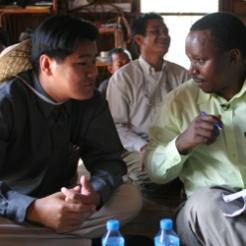VSO is preparing to reduce its administrative costs by 30 per cent as it seeks ways to mitigate the effects of a drop in funding from the Department for International Development of 12 per cent over the next three years.
In the three years to April 2011, VSO was funded by DfID to the tune of £89m. But despite claims from the government that international development funding would be safe from the public spending cuts, VSO’s new three-year grant will total just £78m: £30m this year, £26m in 2012/13 and £22m in 2013/14.
The charity’s chief executive, Marg Mayne, explained that although development funding had been ringfenced, DfID was keen to reduce the size of VSO’s grant so that other organisations could share the pot more evenly.
“We are still a strategic partner and the NGO with the largest grant of this type from DfID,” she told civilsociety.co.uk. "But they want the grant to reduce as a proportion of our total income over the years ahead, that’s why they have reduced it in absolute terms.”
Mayne said that VSO shared that goal. “No organisation wants to be dependent on one donor so for a while now VSO has been reducing its dependence on DfID. In the early part of the 2000s we were 80 or 90 per cent dependent on DfID, now it’s more or less 50 per cent. So getting down to 25 per cent over the next three or four years is part of the trajectory that we want to be on anyway.”
Four-year strategic plan
The charity is one year into a new four-year strategic plan called People First that aims to strengthen its development programmes and impact in tackling poverty. It has already been increasing its income from other sources – almost doubling this over the last three years – and has plans in place to continue this diversification. Fundraising efforts will focus on individual giving, major donors and institutional and statutory funders both here and abroad.
At the same time efforts are under way to cut overheads by 30 per cent, a target Mayne described as “challenging, but one we really need to step up to in order to demonstrate value for money”.
“At the time the Budget was set a lot of public sector services were being asked to reduce their costs by around a third, therefore we thought it wasn’t unreasonable for us to set a similar target.”
New IT systems
VSO plans to invest in IT systems in a bid to achieve the necessary savings. Mayne said: “Like all charities we’ve been extremely cost-conscious over the last decade and now reached the point where we’ve recognised that we really need to invest in our IT to rapidly transform the way we do our business. That way we can make a step-change instead of constant salami-slicing.”
New systems will mainly focus on communications technology but also workflow management.
Mayne admitted there may be some redundancies amongst VSO’s 800 staff (250 of whom are based in the UK) but she hoped that natural wastage and the effect of more of the charity’s income being devoted to programme work would minimise job losses.
“At the end of the day we are looking to increase our impact,” she said. “All the work we are doing around increasing income and reducing costs is in order to increase our impact. Our objective as an organisation is to reach the same number of people we are currently reaching, but to really improve the quality of their lives. It’s about quality, not quantity.”









